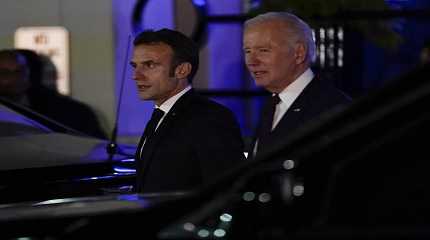
WASHINGTON (AP) — Presidents Joe Biden and Emmanuel Macron are celebrating the longstanding U.S.-French relationship — but these are friends with differences. The French president is using his visit to Washington to sharply criticize aspects of the U.S. president’s signature climate law as a bad deal for Europe.
Biden is set to honor Macron with the first state dinner of his presidency on Thursday evening. First, the two leaders will sit down in the Oval Office for morning talks that officials from both sides said were expected to largely center on the leaders’ efforts to stay united in their response to Russia’s war in Ukraine and to coordinate their approach to an increasingly assertive China.
But ahead of Thursday’s meeting, Macron made clear that he and other European leaders remain deeply concerned about the incentives in a sweeping new climate-related law that favor American-made climate technology, including electric vehicles.
Macron on Wednesday criticized the legislation, known as the Inflation Reduction Act, during a luncheon with U.S. lawmakers and again during a speech at the French embassy. The French president said that while the Biden administration’s efforts to curb climate change should be applauded, the subsidies would be an enormous setback for European companies.
“The choices that have been made ... are choices that will fragment the West,” Macron said at the French embassy. He added that the legislation “creates such differences between the United States of America and Europe that all those who work in many companies (in the U.S.), they will just think, ‘We don’t make investments any more on the other side of the Atlantic.’”
Separately, at the luncheon with members of Congress from both parties, along with business leaders and diplomats, Macron said that major industrial nations need to do more to address climate change and promote biodiversity.
He criticized a deal reached at a recent climate summit in Egypt in which the United States and other wealthy nations agreed to help pay for the damage that an overheating world is inflicting on poor countries. The deal includes few details on how it will be paid for, and Macron said a more comprehensive approach is needed — “not just a new fund we decided which will not be funded and even if it is funded, it will not be rightly allocated.″
Speaking after his prepared remarks and without cameras present, Macron took aim at the Inflation Reduction Act, calling the subsidies harmful to French companies and others in Europe, according to a person in the closed-door meeting. The person requested anonymity to discuss the private comments from Macron.
The European Union has expressed concern that tax credits in the climate law, including those aimed at encouraging Americans to buy electric vehicles, would discriminate against European producers and break World Trade Organization rules.
Germany’s Economy Minister Robert Habeck reiterated Wednesday that he believes parts of the law aren’t compatible with the WTO.
“I believe that this view is largely shared by those countries that are committed to a multilateral trading order,” he told reporters in Berlin. “The Americans know that we see it that way and the European Commission will have told them this too.”
Macron had planned to make his case to U.S. officials against the subsidies, underscoring that it’s crucial for “Europe, like the U.S., to come out stronger ... not weaker” as the world emerges from the tumult of the pandemic and Russia’s invasion of Ukraine, according to a senior French government official who briefed reporters on the condition of anonymity to preview the private talks.
Biden administration officials have countered that the legislation goes a long way in helping the U.S. to meet global goals to curb climate change. White House press secretary Karine Jean-Pierre on Wednesday made the case that the legislation will also provide new opportunities for French companies and others in Europe.
“There’s a number of provisions that will contribute to the growth of clean energy sector globally,” Jean-Pierre told reporters. “It presents significant opportunities for European firms, as well as benefits to EU energy security. And this is not a zero-sum game for us.”
Macron’s latest blunt comments come after he raised eyebrows earlier this month in a speech at a summit in Bangkok. He referred to the U.S. and China as “two big elephants” that are the cusp of creating “a big problem for the rest of jungle.” His visit also comes as both Washington and Paris are keeping an eye on China after protests broke out last weekend in several mainland cities and Hong Kong over Beijing’s “zero COVID” strategy.
“The issue of China will be very high on the agenda for the next couple of days,” White House National Security Council spokesman John Kirby told reporters on Wednesday.
Macron on Wednesday met with Vice President Kamala Harris at NASA headquarters in Washington as both sides looked to highlight U.S.-French cooperation on space. In June, France signed the Artemis Accords, a NASA-led set of principles used to govern international civil use of space. The same month, the U.S. made good on a promise to join the France-led Space for Climate Observatory, which is meant to model and track climate change.
Macron also made a stop at Arlington Cemetery. He and his wife, Brigitte, later had a private dinner with Biden and first lady Jill Biden at a restaurant in Washington’s Georgetown neighborhood.
In addition to his Oval Office talk with Biden on Thursday, Macron will be hosted by Harris for a lunch at the State Department before the evening state dinner for some 350 guests, a glitzy gala to take place in an enormous tented pavilion constructed on the White House South Lawn.
Grammy winner Jon Batiste is scheduled to provide the evening’s entertainment.




